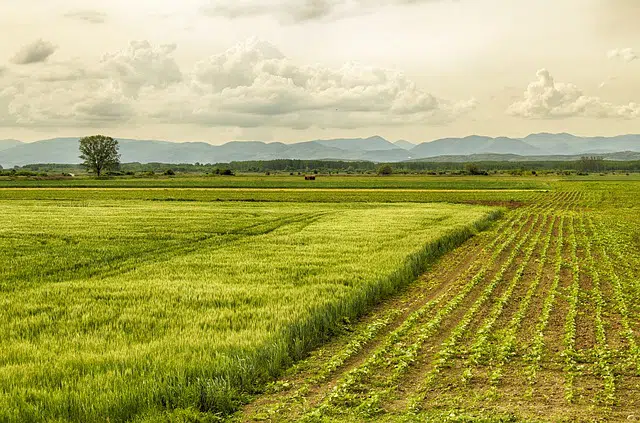
Crop diversification is one of the innovative tactics being used in agriculture today, particularly in Africa, to make farming easier and more effective.
It is an agricultural practice that involves growing many crops on the same area of land. Crop diversification offers various advantages that can help farmers enhance their yields, revenue, and resistance to environmental shocks.
In this blog post, we will explore eight benefits of crop diversity for Africans. Before that, let’s take a look at the reasons why African farmers are becoming more interested in crop diversification.
Reasons Why African Farmers are Taking More Interest in Crop Diversification
- Fewer Market Opportunities
Farmers are realizing that diversifying their crops may open up new market prospects.
In both domestic and foreign markets, there is an increasing desire for exotic and diversified products, which might result in greater farm prices and profit.
- Unpredictable Climate Change
African farmers have suffered greatly as a result of climate change. Due to the frequent droughts and extreme weather events causing reduced crop yields and failures in Africa, farmers have started to adopt crop diversification techniques.
- Food Insecurity
African farmers bear the responsibility for finding solutions to one of the continent’s most pressing problems, food insecurity.
Farmers are discovering that by growing a variety of crops that meet different nutritional needs, they can address the problem of food insecurity. This means that there will be less dependence on a single crop for both food and income.
Benefits of Crop Diversification for African Farmers

Enhanced Soil Health
Growing different crops can improve soil health by preventing erosion, preserving nutrients, and increasing fertility. It can also promote biodiversity and increase the amount of organic matter in the soil.
Increased Revenue and Income Generation
Crop diversification helps to lower the risk of farming operations by reducing the dependence on a single crop.
It also enhances soil health by increasing the diversity of crops that can be grown and by reducing the need for synthetic fertilizers, which can be costly.
It can open up new markets and increase the range of crops that can be sold, making farming more profitable.
Lastly, it helps to increase the resilience of the agricultural system and contributes to stable yields and profitability over time.
Effective Pests and Diseases Management
Crop diversity is a smart way to manage pests and diseases.
When farmers grow a variety of crops, it helps to stop pests and diseases from spreading because they can’t survive on just one type of plant.
This method also attracts helpful bugs and improves the overall health of the plants. By planting different crops, farmers can avoid the risk of pests and diseases wiping out their entire harvest. This is important because it helps to protect their income and prevent crop failures.
Increased Food Security
Growing different crops can improve food security by increasing food availability and variety, making farming more resilient to climate change, and reducing dependence on a single crop.
It can also boost farmers’ income and economic growth in rural communities.
Additionally, crop diversification helps to prevent the spread of pests and diseases, which is one of the causes of food insecurity.
Increased Crop Yields
Crop yield expansion is the major goal of crop diversification. It is expected that agricultural yields would rise as a result of all the efforts involved in crop diversification.
Due to enhanced soil health, less pest and disease burden, and better risk management alternatives for farmers, crop variety may aid in boosting crop yields.
In addition, you get a higher yield when more variety of crops are planted.
Lowered Risk
Crop diversification is a way for farmers to decrease their risk and protect their livelihoods.
When they plant just one type of crop, it’s easy for pests, diseases, or bad weather to ruin the entire harvest. But by planting many different crops, farmers can lower their chances of crop failure. This way, if one crop doesn’t do well, they still have other crops to rely on. It’s like spreading out your risk so you don’t lose everything if something goes wrong.
Reduced Input Costs
Planting a variety of crops can help reduce the amount of money farmers spend on agricultural production by decreasing their need for expensive synthetic inputs.
By minimizing the risks associated with pests and diseases, and soil health, farmers can reduce the amount of money they need to spend on pesticides and other treatments.
Increased Resilience to Climate Change
As climate patterns shift and become more extreme, it’s important for farmers to adapt and grow crops that can withstand drought and high temperatures.
By planting a diverse range of crops, farmers can help increase their resistance to the impacts of climate change. Farmers can plant varieties that are better suited to the changing climate conditions.
This can help ensure that crops continue to thrive and produce even when faced with challenging circumstances. With crop diversification, farmers can better adapt to the impacts of climate change and improve the resilience of their farming operations.
Conclusion
Crop diversification will become more crucial as Africa’s global population grows and climate change brings new challenges to agriculture.
We can assist farmers in adopting more sustainable and diverse agricultural techniques by investing in research, education, and infrastructure.
Finally, crop diversification’s benefits extend well beyond the farm, enhancing the health and well-being of communities all around Africa. It extends to all consumers and every channel linked to agriculture.